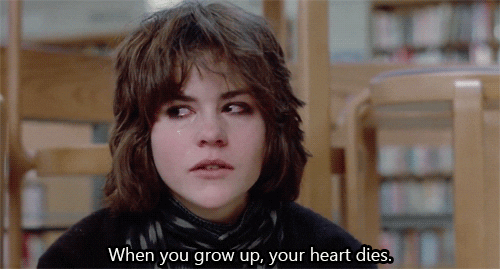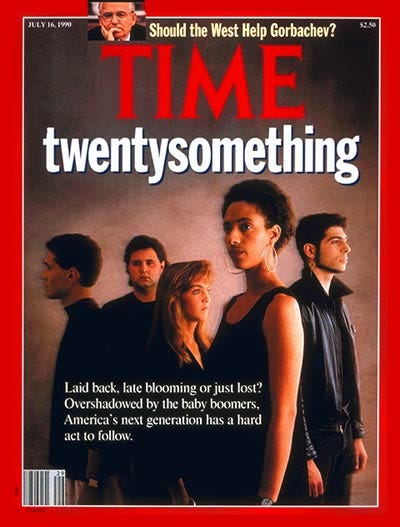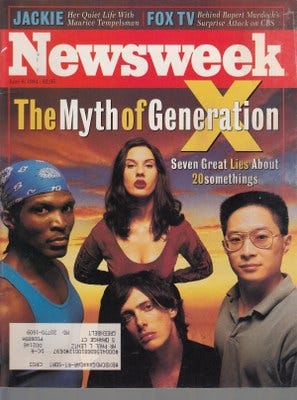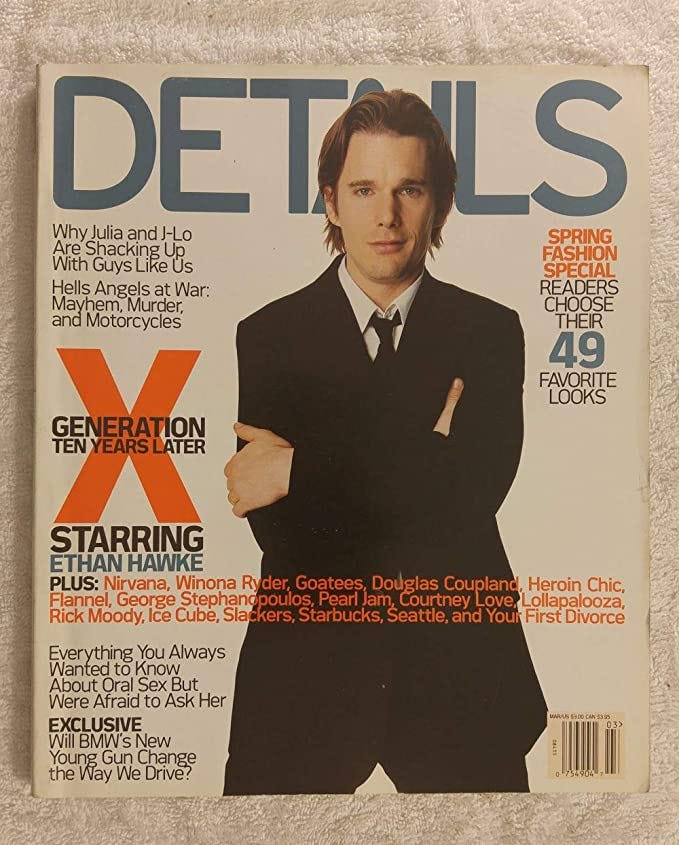The Generational Discourse is Going to Kill Me
and I have chosen the hill I will die on
Friends, I have chosen the political hill I will die on this election season, and it is this: Kamala Harris is Gen X.
My old feminist blogger pal Jill Filipovic, herself a Millennial, has written a new book called OK, Boomer, Let’s Talk. Based on her research, Jill has publicly declared that Kamala is a Boomer.
No. I reject and rebuke it.
First of all, if you write a whole novel describing your generation, and you give that generation a name, the name cannot later be reassigned to an entirely different cohort, especially not by people born 20-odd years after. This is my truth. Douglas Coupland was born in 1961, ergo that, at the very latest, is the beginning of Generation X.
(For that matter, Billy Idol was born in 1955, but I can be reasonable.)
Based on my own primary source research (a hazy recollection of the 1990s), this used to be taken as read. In fact, when people in the ’90s discussed “Generation X,” I seem to recall they meant people born between 1960ish and 1974ish. As a 1975 baby, I felt slightly outside this group for a long time, despite sharing some pop culture references and whatnot. (I also share parents with siblings born in 1960 and 1961, so I was part of the same literal generation as people Coupland’s age, yet vividly aware of how much younger I was. For the record, my sister [1961] identifies as X and my brother [1960] didn’t answer my DM about it, so there you go.) Before Millennials became a thing, people my age and slightly younger were the vanguard of “Generation Y,” but the label didn’t stick. Once we had the term “Millennial,” “Gen Y” disappeared, and those of us born between 1975 and 1980 were quietly reassigned to Gen X.
That’s fine with me. It fits, especially now that I’m middle-aged, and categorical distinctions between me and people fifteen years my senior are increasingly blurry. But it also fits because Reality Bites came along in my nineteenth year on earth and reset everyone’s notion of what “Gen X” meant. Helen Childress, who wrote it, is just a few years older than me, as are Winona Ryder and Ethan Hawke—they all fell into the original “X” category that I just missed, but the characters in Reality Bites felt very much like my cohort. Director Ben Stiller (b. 1965) is Gen X by any standard, yet he was old enough to play the yuppie antagonist who bought into the system instead of critiquing it—which, once upon a time, was the defining distinction between Gen X and Boomers. Janeane Garofalo (b. 1964) is a Boomer if Kamala is, but her baby bangs and vintage dresses, one-liners and withering put-downs, were what my friends and I went nuts for.

The ethos—everything sucks; the people with real jobs and money have no souls; young people are faced with a choice between selling our souls and living on the margins; and the only thing that makes any of it bearable is hanging with friends and falling in love and weed—was what connected Reality Bites to Generation X to my life.
It’s simplistic and classist and very, very white, all of which is also characteristic of my generation’s public image. The scene in the gif above depicts Janeane Garofalo’s character and friends stocking up on groceries at a gas station, because they’re broke—not poor, broke—and the one credit card that has room on it is the one her father gave her for gas. That’s the Reality Bites version of Gen X: we’re the “If you called your dad, he could stop it all” generation.
(Jarvis Cocker was born in 1963, and he is ours. Come on.)
And that happens to be completely on target for my personal experience as a white, middle-class, cishet suburban native who could still have called my dad for money until the day he died. Culturally, I identify strongly as part of the Reality Bites generation because I experienced that specific combination of genuine rage and fear at the world our parents gave us with a lack of genuine anxiety about whether I’d be okay anyway. Most people—of any generation—do not lack that anxiety, because it takes a lot of resources to lack it.
That’s not to say people born in the 1970s had no collective anxiety that crossed lines of race, class, gender, and sexuality. We all grew up with the fear of nuclear holocaust, came of age sexually before the advent of life-saving HIV drugs, and hit adulthood during or near a recession. But ambient, arm’s-length anxieties are not the same as a daily experience of racism, sexual harassment, violent homophobia and transphobia, or watching your friends and lovers die by the dozen from a viral pandemic the government refuses to do anything about. So the fact that our generation, when we’re talked about at all, is usually defined as white, straight people indulging largely unearned cynicism should be sufficient evidence that the generational discourse is bullshit.
The generational discourse is bullshit. I understand this. But somehow, I can’t stop taking the bait.
Being born in a particular year doesn’t mean you share formative personal experiences or political opinions with other people born in that year. Certain cultural experiences, sure, and that’s not nothing—especially among those of us who grew up before the internet enabled us all to get real fuckin’ niche. But I also don’t think cultural experiences are what we’re really talking about when we talk about generations.
Quite simply, I think we’re talking about age. We’re talking about the differences between people in their twenties and thirties, forties and fifties, and sixties and seventies. But to admit that would be to admit how much of the discourse is molded by plain old ageism.
If you call them “Fucking Boomers” instead of “Fucking old people,” you can go on to claim your disgust is not only morally pure but the basis of a solid social justice argument. And if you call them “Fucking Millennials” (or, now, Xennials) instead of “Fucking young people,” you can credibly claim you’ve identified a widespread problem other than “I am now old enough to be chronically irritated by younger people who do the exact same ‘entitled’ and ‘selfish’ things I did when I was their age.”
It’s become a running joke that Generation X, sandwiched between two much larger cohorts, inevitably gets left out of conversations, graphics, and articles about demographic differences. But when I reframe this as a conversation about age—as opposed to some vague, birth-year-related cultural affiliation—I understand why it sometimes gets so far under my skin, I’d flay myself to relieve the discomfort.
Case in point, today’s CNN op-ed—Jill again, but I swear I’m not picking on her; this is just her beat at the moment— “Boomers need to hand the reins of political power to Millennials.”
I remember talking to a friend six or seven years ago about how grating all of the “intergenerational feminist wars” discourse was, because it pitted the likes of Gloria Steinem (b. 1934) against the likes of Jill (b. 1983), with no mention whatsoever of those of us who came of age in the ’80s and ’90s. We found ourselves fully erased by articles declaring that the third wave of feminism was born on blogs, as if zines and Riot Grrl and Bust and Bitch and Manifesta never happened. As if Queer Theory magically emerged fully formed in the 21st century. As if Rebecca Walker (b. 1969), daughter of Alice (b. 1944), hadn’t definitively launched our wave with a 1992 Ms. magazine article about feeling called to action by the Clarence Thomas hearings.
(Now, women who watched in real time and wore homemade “I believe Anita Hill” buttons are berated by young people who watched clips on YouTube for supporting Joe Biden as our last bulwark against totalitarianism. Would putting a dozen upside-down smiley face emojis here make me look old?)
When it was just feminist infighting, my overwhelming feeling was “What else is new?” But now, the Boomer v. Millennial fad is everywhere, and being left out of the conversation has higher stakes. What does “Boomers need to hand the reins to Millennials” mean for those of us who are currently between 40 and 60? Are we supposed to retire early, when most of us just finished paying off student loans and need to work for at least another decade or two to have anything like security? Must we agree, to prove we are not the dreaded Boomers who can’t see reason, that the generation behind us contains all the people capable of solving every problem we currently face? Are we meant to concede that even if we don’t own property or have savings, won’t be able to afford private health insurance during the years before we’re eligible for Medicaid, and have twenty to forty years of valuable work experience we’d love to continue using, it’s now on us to make way for ducklings?
Or are we just supposed to keep pretending it’s a joke that everyone forgets we exist?
One reason people get fucking cranky as they get older is that we possess both accumulated wisdom and memories of how we used to think. Younger people hate hearing this, which we know, because we used to be younger people! And we, too, used to think that our generation was uniquely incomprehensible to our elders. We, too, used to believe youth endowed us with powers of both discernment and compassion that would wither to dust before our fortieth birthdays.

(Ally Sheedy, b. 1962. Ours.)
We, too, saw compromise as a cop-out, everyone as a sell-out, and baby steps as backward steps. And by “we,” I mean Boomers—who were well known for not trusting anyone over thirty until they all turned thirty and a lot of them discovered money—as well as Gen Xers, who pioneered sneering at people born in the ’40s and ’50s for their sociopathic greed.
That was the point of us, back when we had a point—i.e., when we were in our twenties and thirties, so the media loved us best.




This is one of the big secrets that comes with age: Anyone old enough to do interesting things, but young enough to do them sexily, belongs to a cohort that will be discussed, analyzed, and promoted to death. It will be given a catchy name. It will be resented by older people and briefly aspired to by younger ones.
And then it will turn forty, and no one will give a fuck about it anymore until it gets old enough to represent the Old People who ruin everything.
Size matters, I suppose—Boomers and Millennials are much larger groups. But I’ll be shocked if we’re not all discussing the brand-new, historically unique war between Xennials and Gen X in ten years’ time.
In the meantime, fellow Xers, don’t let them tell you that being caught between those two behemoths means we’ll never have one of our own cohort in the White House. We already did; under the Coupland Rule, Barack Obama (b. 1961) was our first Gen X president.
Kamala Harris will, with any luck, be our second.

Thank you, thank you, thank you. You can imagine how my black, leftwing, lesbian ass is tired of this generational BS.
Sometimes I wish millennials would just take their boomer parents to therapy, yell at them, and leave the rest of the fucking world out of it.